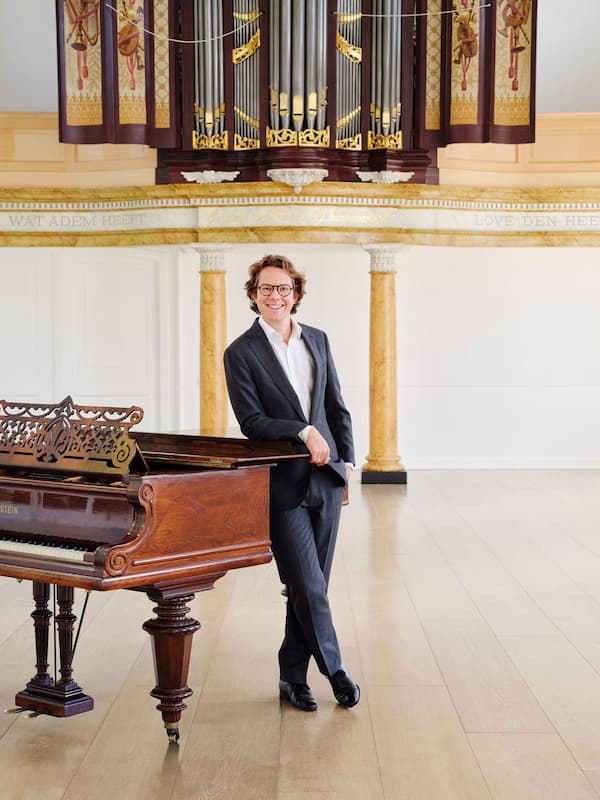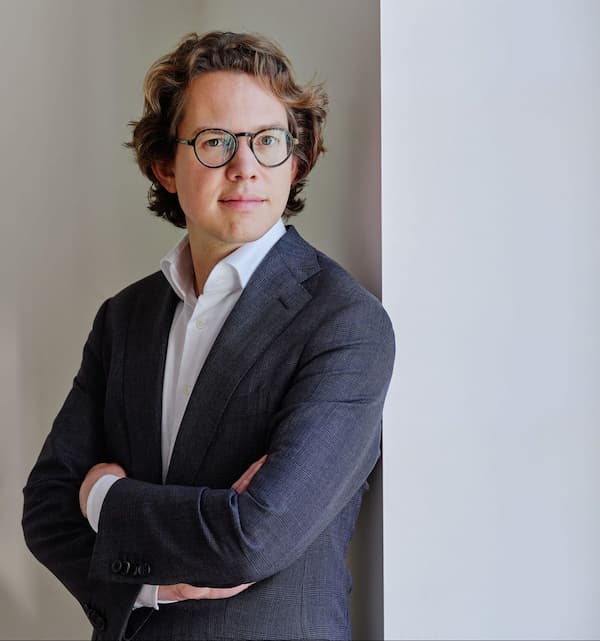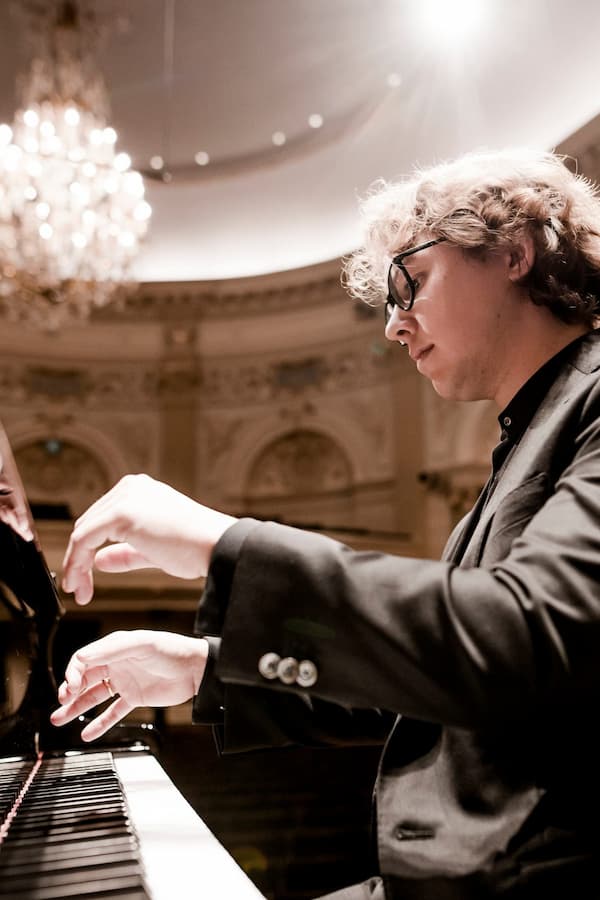‘Express the Music Instead of Ourselves’

Hannes Minnaar © Lars van den Brink
The playing of Dutch pianist Hannes Minnaar has been described as ‘buoyant and convincingly thought-through’ (The Guardian) and ‘free of bluff and swagger and in deference of the music at all times’ (NRC). He is a sought-after pianist both as a soloist and collaborator, having performed across the Netherlands and further afield in Europe with artists including Herbert Blomstedt, Jirí Belohlávek, and the Royal Concertgebouw orchestra.
Hannes is a member of the Van Baerle Trio, founded in 2004 and retaining its original members to this day: Hannes, along with violinist Maria Milstein and cellist Gideon den Herder. The trio were 2013-14 ECHO rising stars and, amongst their regular performing work, have recorded the complete piano trio works of Beethoven.
Beethoven is a strong thread running through Hannes’ creative life: he has recorded all the piano concertos with the Netherlands Symphony Orchestra, and it is a piano quintet version of the fourth concerto that Hannes will perform when he visits Hong Kong this May, along with a solo recital of Shostakovich’s Preludes and Fugues.
I catch up with Hannes on the morning of a concert in Antwerp, where he will be performing Beethoven’s second concerto that evening, and from there, we jump off into a conversation about his relationship to this special composer, taking in the vastness of the piano repertoire, and Hannes’ quest to capture the ‘essence’ of music in performance.
What is special to you about Beethoven’s music?
I really love Beethoven. I think the second piano concerto is perhaps the least played of the five concertos, but it’s a great piece. There’s so much energy and it’s captivating from the first note.
There is a lot of repertoire that is so great that you could spend your whole life with it. I think Rachmaninoff said that a lifetime is not enough for music, and this is especially true with the piano repertoire.
I could already spend my whole life just working on the Beethoven piano concertos. The fourth is perhaps the dearest to me, as it is to many other pianists and much of the public.
It is a very peculiar piece, I find. There is something very intimate yet at the same time very powerful, sort of an inner strength put in a very intimate way. It sounds quite contradictory, but it makes for such a personal, strong and emotional piece.
Thinking of that quote from Rachmaninoff: how do you decide what works to have in your repertoire?

© Lars van den Brink
I have to say that I struggle with that – it’s difficult to choose sometimes!
Sometimes, I have a very strong feeling that I should do a certain piece, which I try to programme, but there’s a balance between what I like and want to play and what I’m asked to play by promoters.
Brahms: Six Pieces for Piano, Op. 118 – II. Intermezzo
Which other composers do you resonate with strongly?
Bach is the source of many things, at least for piano music, and he is the greatest of all – a converging point in music history from my simple, Western perspective… Brahms is a favourite of mine, and Ravel, along with Mozart, Fauré, Sweelinck, Matthias Weckmann. Oh, and I almost forgot to mention Percy Grainger! I really enjoy contemporary music too, and over the last few years I’ve been coming back to Shostakovich. His Preludes and Fugues, which I’ll be playing in Hong Kong, are very dear to me.
There are loud and intense moments in these Preludes and Fugues, actually there’s everything in them, but the stillness and sadness that return in many of the fugues are for me the quintessential aspect of this work. It’s a very peculiar mix, of course, since the inspiration of Bach is there in almost every bar. For me this was the piece with which I got to know Shostakovich. I don’t think I knew anything else by him when I came across this piece, about 25 years ago. I was immediately captivated by it and felt a strong connection there, especially with the fugues. I’m a fugue lover!
Johann Sebastian Bach – Goldbergvariaties: Adagio & Quodlibet
You recorded Bach’s Goldberg Variations during the 2020 pandemic – what prompted the choice of this repertoire to record at that moment?
I was struggling with the Goldberg Variations for a couple of years already, and then in 2020, when all my concerts were cancelled I noticed I could play it! I thought I had to record it then or else it would be gone again.
It’s the perfect music for any time, but at that time especially it really helped me. I was also working on other music at the time, like Gaspard de la nuit and some Schumann, and they somehow felt like escaping from the terrible times we were in.
But with Bach, you can stay in the here and now and it feels like a medicine. It’s not music that you escape with, but studying its clear lines felt like it helped to unboggle the mind, while its musical content nourishes the soul.
How did you find your way to the piano?

© Simon van Boxtel
It was sort of by accident. For as long as I can remember I was always attracted by music, including classical music. My parents didn’t really listen to classical music but my grandfather had a collection of vinyl with mostly very ‘classical’ stuff.
I remember some family party where some distant relative started to play the guitar, and that’s one of my first musical memories. Ever since then I wanted to play an instrument.
Nobody played an instrument in my family, and my parents knew a piano teacher a couple of streets away from where we lived. They asked her if she could teach me, and then it turned out to be the piano that was my instrument. I also tried the trumpet, but I thought the piano was easier at the time!
When did you decide to pursue music as a career?
I was so obsessed with music that I was always behind a keyboard. I somehow always felt I should do this, I think. When I was 13, I went to a ‘serious’ teacher who told me that I had to learn everything by heart and so on. He was very strict with me, which I found difficult, but he said that if I wanted to become a pianist, then I would have to work.
That was the moment that I realised I wanted to be a pianist, but I think I’d already felt it before. Somehow, my path was to study classical piano and be involved in classical music – I really like that, and I think at this stage, I just played everything I could find.
I also had a book with Elton John songs that my father bought me because he’s an Elton John fan, and I played songs from Disney movies that I found in the library. I could have imagined going towards a more popular style, to being a keyboard player in a band, but in the end, classical music won out.
Do you keep your eclectic taste to this day?
I do listen to jazz. I’m a big Keith Jarrett fan, and what he does is also quite classical. But no, I left Elton John with my parents!
I would have loved to be able to play jazz, but it’s such a different world. I couldn’t find it on my own, because the piano sounds like a different instrument, with all the different scales and so on. I was never taught jazz, but I’d still love to be able to do it. When I have the notes in front of me, I can find colours and sounds, but I can’t improvise in this way.
You mention on your website that the playing of pianists from older generations, including Alfred Cortot and Wilhelm Kempff, inspires you. What is it about them that resonates with you?
What they do is incredibly personal. That’s what makes it interesting, I think. But it is personal in a ‘serving’ way. Of course Cortot is such a big personality that you can immediately recognise him from his tone. But his playing elevates the music, and it doesn’t stand in the music’s way, as can happen with some great personalities.
And Kempff has such a natural way of playing. He absolutely never exaggerates, and I am surprised every time I hear him because it is so natural. He just plays: he catches the essence of the music, which is the most important thing.
How has this informed your own approach to balancing your own personality against ‘serving’ the music?
It is a very interesting mix. I was always encouraged to do more, to interpret more, and I sort of understand this – music needs to be interpreted, of course. But you have to do it right. Expressing our personalities happens automatically, I think, but our aim, of course, is to express the music instead of ourselves.
What do you do in your spare time?
I don’t have much spare time, as I have a young family! But I like reading – I’ve always enjoyed reading. I also play the church organ. I stopped doing it for ten years because I needed the time to focus on the piano, but then, during the pandemic, I had more time to revisit it. Someone invited me to share a recital, and I couldn’t say no!
My hobby is to play Bach on very beautiful, impressive, large Dutch church organs. A Steinway is a mighty machine too, of course, but when you play an instrument which is 15 metres high, it’s incredible. It’s sort of a physical sensation to have that sound in such a space.
For more of the best in classical music, sign up for our E-Newsletter




